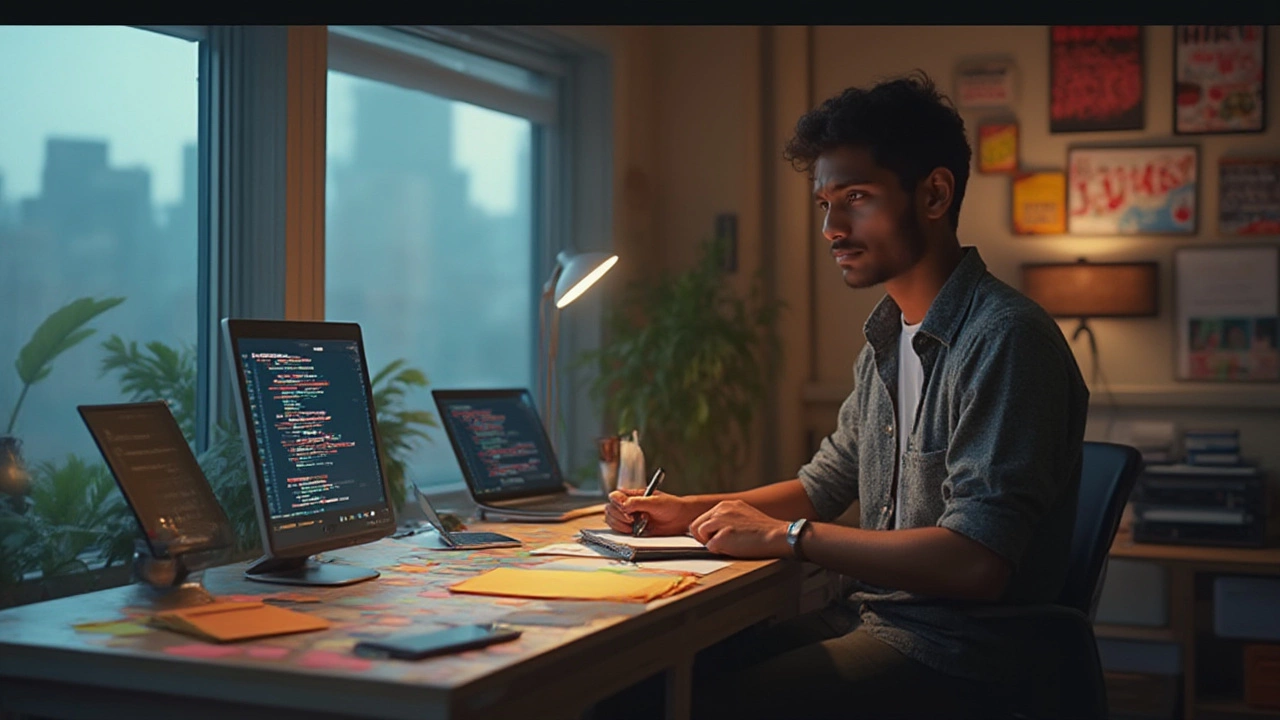Picture this: My son Percival once asked if he could learn to make his own game, even though he’d never written a single line of code. That hit me—so many people assume you have to be a math whiz or computer nerd to touch JavaScript. That's not true. JavaScript is actually designed so anyone can get the basics, even if you’ve never felt at home in the tech world.
You don’t need fancy tools or expensive software. Open your web browser (think Chrome or Firefox), right-click anywhere, select “Inspect,” and you’ve got the Console ready for JavaScript experiments. It's that simple: no downloads, no setup headache. You can see results right away from a single line of code. This instant feedback helps a lot because you learn fastest by trying, messing up, and tweaking things until they work.
If typing alert('Hello world!') feels like a mountain, don't sweat it. There are step-by-step guides, beginner-friendly tutorials, and video walkthroughs created for people who have zero background in programming. Platforms like freeCodeCamp and Codecademy use plain English and hands-on projects, so you never feel lost.
- What Makes JavaScript Friendly for Beginners
- Real Life Success Stories (No Coding Background Required)
- Smart Ways to Learn JavaScript Fast
- Pitfalls to Watch Out For (And How to Handle Them)
What Makes JavaScript Friendly for Beginners
One of the best things about learn JavaScript is you don’t need a fancy setup or weeks of bootcamp just to get started. All you need is your web browser, seriously. You can mess around with code right away in the Console—no scary downloads, piles of files, or waiting for things to load.
Another thing: the language itself is actually made to be easy for total newbies to pick up. JavaScript lets you skip over a lot of the confusing stuff that makes other programming languages a headache for beginners. For example:
- No need to declare a variable’s type—just type
let myName = 'Percival';and it works. - Errors are pretty readable. The browser will literally tell you if you forget something simple, like a semicolon or a bracket, and even highlight the problem spot.
- You get instant results. Type alert('Hello!') and a pop-up jumps out. That's a massive motivation boost when you’re just starting.
A lot of beginner resources are made just for folks who have never written code in their life. Sites like W3Schools, freeCodeCamp, and even YouTube have whole playlists explaining every step and common mistake. And when you hit a wall? Google has millions of search results and forums with real people ready to help.
Here’s a quick peek at how quickly you can go from newbie to making things happen with JavaScript:
| Experience Level | What You Can Build |
|---|---|
| First Hour | Simple popups, basic math, showing messages |
| First Week | Interactive buttons, color-changing text |
| First Month | Basic games, calculators, simple web apps |
Straight up—JavaScript is everywhere on the web. So you don’t just learn for the sake of learning. You see results every time you visit a site that responds to you clicking, typing, or scrolling. For a total beginner, that’s about as rewarding as it gets.
Real Life Success Stories (No Coding Background Required)
It’s easy to think that only hardcore tech pros can actually master JavaScript. But the real world says otherwise. Think of Quincy Larson, the founder of freeCodeCamp. Before learning to code, he was an English teacher. He picked up JavaScript with zero computer science background and built one of the most popular online coding schools.
You’ll also find regular folks who switched careers. There's Ali Spittel, now a popular software engineer and educator, who started out studying journalism. She taught herself JavaScript after college. She’s talked on podcasts about struggling with her first coding lesson, but over time, built websites from scratch—and now she teaches thousands of others to do the same.
In a recent Stack Overflow Developer Survey, nearly 41% of people learning JavaScript in 2024 had no tech-related degree. That means the majority of new coders are just self-starters, hobbyists, or people simply curious about how the web works.
| Success Story | Background | JavaScript Achievement |
|---|---|---|
| Quincy Larson | English Teacher | Founded freeCodeCamp |
| Ali Spittel | Journalism Graduate | Web Developer & Educator |
| Jessica Chan | Digital Marketer | Built educational YouTube channel "Coder Coder" |
And if you just want proof from my own life—I once had a neighbor, Sarah. She ran an online bakery. After seeing all the manual work involved in managing cake orders, she jumped into YouTube tutorials to pick up JavaScript. With less than three months of practice, she was able to build a form that tracked her orders and sent her emails automatically—total game changer for her business.
The pattern is clear: you don’t have to start out as a "computer person" to succeed with JavaScript. Plenty of people, even from creative or completely unrelated fields, are building websites, web apps, and even turning their side gigs into full-time jobs. If they can do it, so can you.

Smart Ways to Learn JavaScript Fast
Want to learn JavaScript as a total beginner? You don't need to take the slow road. There are quick, smart ways to pick up the basics and build confidence, even if you’ve never coded before. Let’s get into what actually works.
- Tackle real projects early. Make something fun or useful, like a clickable to-do list or a simple online calculator. This isn’t just for bragging rights—getting your hands dirty keeps you interested and helps stuff stick faster.
- Use interactive learning platforms. Sites like Codecademy, freeCodeCamp, and Scrimba break things down so you’re not stuck reading walls of text. You write real code and see what happens right away. A 2023 survey from Stack Overflow found that over 50% of people who learned online did so using these hands-on sites.
- Learn one thing at a time. Don’t try to memorize everything. Focus on a single topic—like variables, functions, or loops—then build tiny examples using just that topic. This works better than trying to cram the whole language at once.
- Join beginner communities. Forums like r/learnjavascript or Discord groups can get you unstuck fast, and somebody will always answer your "dumb" question (hint: there are no dumb questions when you start out). Sharing what you’re working on makes you learn faster too.
- Keep cheat sheets handy. Nobody remembers syntax off the bat. Digital cheat sheets for JavaScript are like having training wheels so you can keep moving without stopping all the time to look up details.
If you want a quick view of what beginners say helps most, check out this table:
| Learning Method | Reported Success (2024 survey) |
|---|---|
| Building Small Projects | 73% |
| Interactive Online Platforms | 68% |
| Watching Code-Along Videos | 57% |
| Reading Books Only | 19% |
The fastest path? Focus on doing, not just reading. A little bit every day adds up, and soon you’ll be writing JavaScript for real projects instead of just dreaming about it.
Pitfalls to Watch Out For (And How to Handle Them)
Jumping into learn JavaScript as a non coder? Let’s talk about the real bumps you might hit, and how to avoid wiping out.
First up: information overload. The web is packed with blogs, courses, and tutorials for beginners. Some give good advice, but a lot will talk in circles or go way too fast. If you try to learn from five different sources at once, you’ll probably just get confused. Stick to one beginner-friendly path (like freeCodeCamp or W3Schools) until you feel steady. Less bouncing, more understanding.
Errors are a big deal. Typos happen, and even missed commas can break your code. Here’s the thing: you’ll mess up, just like everyone else. The trick is not to panic. Read error messages closely—they usually tell you what’s wrong. Google them word-for-word. No shame; everyone does it, even pros with ten years’ experience.
JavaScript changes a lot, and sometimes you’ll find old tutorials teaching outdated stuff (like using var everywhere instead of the newer let and const). Double-check you’re learning the latest version. Most trusted tutorials are updating regularly. If you see var on every line, it’s probably an old approach.
One more common barrier is trying to learn everything at once. JavaScript has frameworks (React, Vue, etc.), libraries, and a thousand “must-know” buzzwords. As a non coder, you only need the basics: variables, functions, loops, and objects. Nail those, and move on when you’re ready.
For perspective, check this out:
| Pitfall | What Usually Happens | How to Fix It |
|---|---|---|
| Typos | Error pops up, code won’t run | Check spelling, compare to examples |
| Old Tutorials | Learn outdated habits | Stick to recent resources (post-2020) |
| Trying to Learn It All | Feel overwhelmed, give up | Focus on one topic at a time |
| Ignoring Errors | Frustration, code breaks more | Read and Google errors |
If you get stuck, there’s a huge online community ready to help. The Stack Overflow JavaScript section is loaded with answers for nearly every question a beginner could have. Don’t be shy—someone else has hit the same wall before.
Stay patient and don’t expect perfect results right away. One small win at a time is how everyone starts, even people who now make a living off JavaScript.


